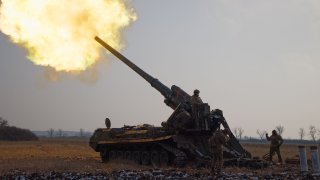European Security After the Ukraine War
Not since 1945 has the outlook for European security been so precarious.
A peace treaty between Russia and Ukraine would provide added protection. The time it takes to negotiate a political settlement helps ensure that it endures, but peace settlements following wars are now rare. Such an agreement would most likely veer into broader NATO-Russia talks, potentially triggering arms control measures on conventional and nuclear weaponry. The likelihood that more Ukrainian territory would be restored could increase after Putin’s departure. New leadership in Moscow might be willing to trade some territory for Western economic concessions, decreasing Russian reliance on China.
U.S. Intervention to End the Fighting?
Trump has promised to end the Ukraine war in twenty-four hours, most recently in the June 27 Biden-Trump debate, where he vowed to end the conflict between his November election and the official January 2025 inauguration. Most observers are confused about what Trump would actually do. A Bloomberg report assesses that Trump would use the threat of stopping all military assistance to get Ukraine’s President Zelensky to the negotiating table while telling Putin that he would turn on the taps if he doesn’t negotiate. If Zelensky refuses to engage with Putin, it would be a good excuse for Trump to walk away from providing any help to Ukraine.
In the debate, Trump said Putin’s terms are “unacceptable,” with some analysts assessing that he would not concede to Putin’s demands for the cession of the four oblasts, which Russia partially occupies. During an earlier Fox TV interview, Trump was not as clear-cut about rejecting Putin’s demands, saying he hopes he will not have to choose between Putin “swallowing” Ukraine and sending weapons to Kyiv. In the debate, Trump appeared dead set against providing more U.S. aid to Ukraine, falsely claiming: “Biden is giving $200 billion or more to Ukraine [the actual value is $107 billion]. That’s a lot of money. Every time Zelensky comes to this country, he walks away with $60 billion. The greatest salesman ever.”
Trump will most likely attempt to negotiate with Putin without the Europeans. It is worthwhile to remember Trump’s efforts to negotiate with North Korean leader Kim Jong-Un in June 2019, after being the first U.S. president to meet with Kim. “By the end of Trump’s term, the talks had faltered, and he had little more to show for his efforts than a drawer full of flattering letters,” according to a Wilson Center scholar. As happened with the Kim talks, Trump might walk away, hoisting all the responsibility on the Europeans for helping Ukraine and bringing the conflict to an end. Some influential Republican strategists want Washington to turn away from Europe anyway and focus on Asia instead.
The Bottom Line for Europe
Europe faces two threats: continued war on its border that could escalate into a larger one with Russia and a decrease in U.S. support for Ukraine if Trump is elected in November. Over the longer run, greater European defense will be necessary as a deterrent against Russian aggression. Still, diplomatic deftness and flexibility will be needed to turn any possible ceasefire into a permanent peace. Absent a clear victory on either side, both Russia and Ukraine must feel satisfied with any deal to make it last.
Mathew Burrows is a curator of the Red Cell project at the Stimson Center, drawing from a long career in the intelligence community. He serves as Counselor to the President and CEO of Stimson, is the Program Lead of the Strategic Foresight Hub, and was the former Counselor at the National Intelligence Council (NIC), where he set up and directed the NIC’s Long Range Analysis Unit, which is now known as the Strategic Futures Group.
Image: Dmytro Larin / Shutterstock.com.

